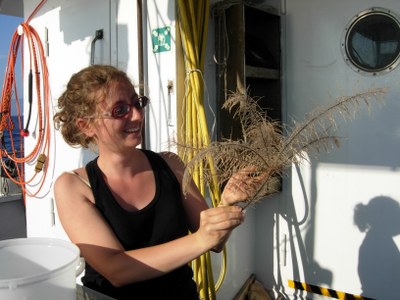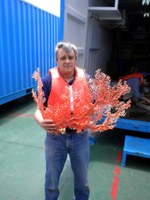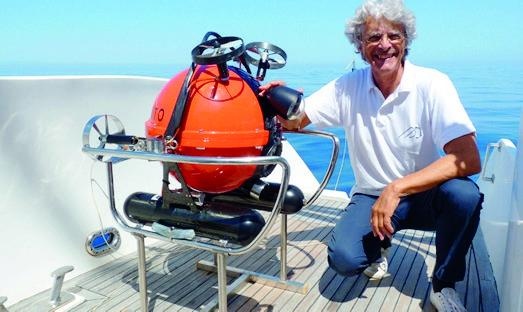
Marzia Bo is a marine zoologist with a specialization in taxonomy, biology and ecology of benthic organisms, in particular Mediterranean and tropical black corals. She obtained her PhD title in Marine Biology and Ecology in 2009 carrying out a research on antipatharians focusing on their morphological taxonomy, phylogenesis, ecology and biology (including studies on associated fauna, growth, and reproduction). Starting from 2008 she started to explore and characterize the Mediterranean deep benthic communities through ROV technology. She developed her competences in the taxonomy and ecology of deep benthic species with particular attention to black corals. She has been involved in numerous projects focused on the coral forests mapping, biocoenotic characterization and estimation of anthropic impact of benthic communities within different Mediterranean deep ecosystems. She is PI in the MIUR-SIR Project BioMount, which aims at unveiling the biodiversity, ecological traits and vulnerability of the megabenthic assemblages inhabiting Ligurian and Tyrrhenian seamounts. She currently holds a position for Researcher B (BIO05_Zoology) at the University of Genova (Italy).
Email: marzia.bo@unige.it
Martina Coppari is a marine biologist. Her research is mainly focused on the ecology of benthic suspension feeders. She obtained her PhD in Environmental Science and Technologies in 2015 at the Autonomous University of Barcelona (Spain) studying the importance of benthic suspension feeders in the biogeochemical cycles and as carbon sinks. During her PhD she learned and applied ROV imaging and video analysis to characterize the spatial, bathymetrical distribution and population structure of different benthic suspension feeders (mainly sponges, ascidians and gorgonians). She performed several in situ feeding experiments to estimate the role of suspension feeders in benthic-pelagic coupling processes. Since the 2016 she is working as a postdoc researcher at the University of Genoa (Italy) and her research is focused on the characterization of the ecology of cold-water corals in the framework of the BioMount project founded by the MIUR-SIR. In particular, she leads the experiments involving isotopic diet, reproductive traits, bacterial associations, as well as the growth pattern of the target species of the project, the black coral Antipathella subpinnata.
Email: martina.coppari@edu.unige.it
Francesco Massa is a post-doc researcher since 2014 at DISTAV (University of Genoa). Since 2005, he has been involved in different studies and he has developed a marine information system for environmental data management (MACISTE). In particular he is skilled about geodatabase, GIS and webGIS, OGC and INSPIRE standards, geoservices (WMS/WFS/WCS) and Sensors Web (SWE/SOS) and oceanographic instruments (CTD,ADCP) and the marine environmental sampling activities.Moreover he is training in ROV piloting. In 2014 he obtained a PhD in Marine Science. Main interests are the use of new technology in real-time in situ environmental data acquisition with oceanography instruments (CTD, ADCP) and vehicles (AUV/ROV), the development of new sensors for environmental monitoring and data sharing. His involvement in the MIUR-SIR Project BioMount concerns the environmental data probes functioning during the oceanographic surveys, CTD data elaboration as well as the creation and management of the WEBGIS platform.
Email: francesco.massa@unige.it
Federica Costantini is a Researcher at the Department of Biological, Geological and Environmental Science, Ravenna Campus, University of Bologna. She has a PhD in Environmental Science. The scientific interest of Federica Costantini is related to population genetics and molecular systematic of coastal marine invertebrates for biodiversity conservation and management purposes. Specifically she is interested in: 1) evaluating how anthropogenic impacts alter the genetic make-up of the populations; 2) identifying common barriers to gene flow for biodiversity conservation and 3) identifying management and conservation units in harvested species. She works in a variety of marine coastal environments, including rocky shores, submarine caves, marine urban habitats, artificial coastal and offshore structures and she uses innovative genetic and genomic tools (e.g. microsatellite loci, mitochondrial DNA sequences and SNP markers obtained using NGS approaches). She is involved in the MIUR-SIR Project BioMount targeting all the genetic analyses, in particular DNA extraction, amplification of mithocondrial and nuclear regions, RAD sequencing and bioinformatics. Her goal is to highlight the genetic variability and connectivity among coastal and seamount populations of the target species of the project, the black coral Antipathella subpinnata.
Email: federica.costantini@unibo.it

Giorgio Bavestrello is Full Professor of Zoology at the Department of Sciences of the Earth, the Environment and the Life (DiSTAV) of the University of Genova. From 2014 to 2017 he has coordinated the course of Natural and Environmental Sciences and, from 2017, the course of Biology. After the PhD in Marine Sciences obtained in the University of Genoa in 1990, he has dedicated his research activity to the taxonomy, the biology and the ecology of marine benthic organisms of hard bottoms, mainly sponges and cnidarians in the Mediterranean Sea, Indo-Pacific Ocean (particularly Indonesia, Vietnam and Japan) and Antarctica. Giorgio Bavestrello had published more than 400 scientific papers. He has coordinated several projects about sponge and cnidarian biology, some of them in collaboration with international scientific structures (e.g. Sam Ratulangi University Manado, Indonesia; Andalas University Padang, Indonesia; Hai Phong Institute of Oceanography Viet Nam; Kochi University, Japan; Rissho University Tokyo, Japan). He is involved in the MIUR-SIR Project BioMount supporting the data elaboration, ecological and conservation models for deep-sea fauna.
Email: giorgio.bavestrello@unige.it
Guido Gay took his engineer doctoral degree at Politecnico of Milano in 1964. He started his activities in 1968 as entrepreneur of a start-up company devoted to the design and manufacture of electronics measuring instruments. Being a passionate sea lover and sailor he combined his passion for the sea with his talent as inventor and in the first years of the 70s he started to study and create the first remote-controlled underwater vehicles, hence becoming a pioneer in this field. In 1979 Guido Gay founded GAYMARINE, an Italian based company, and ten years later IDROBOTICA in Switzerland, both companies dedicated to the design, development and production of the now well-known PLUTO family of underwater ROVs. In 1990 Guido designed an original catamaran sail yacht (DAEDALUS) intended both for recreation and as a hosting station for the ROVs PLUTO. After a long experience sailing the oceans around the world he focused in experimenting new technologies for the exploration of the abyss. In the deep Mediterranean sea bottom he found dozens of ancient roman wrecks and many modern wrecks. He is involved in the MIUR-SIR Project BioMount with his recently founded fondation AzioneMare. He directed all the onboard operations, including vessel mobilitation, side-scan sonar and ROV exploration.
Email: info@azionemare.org

